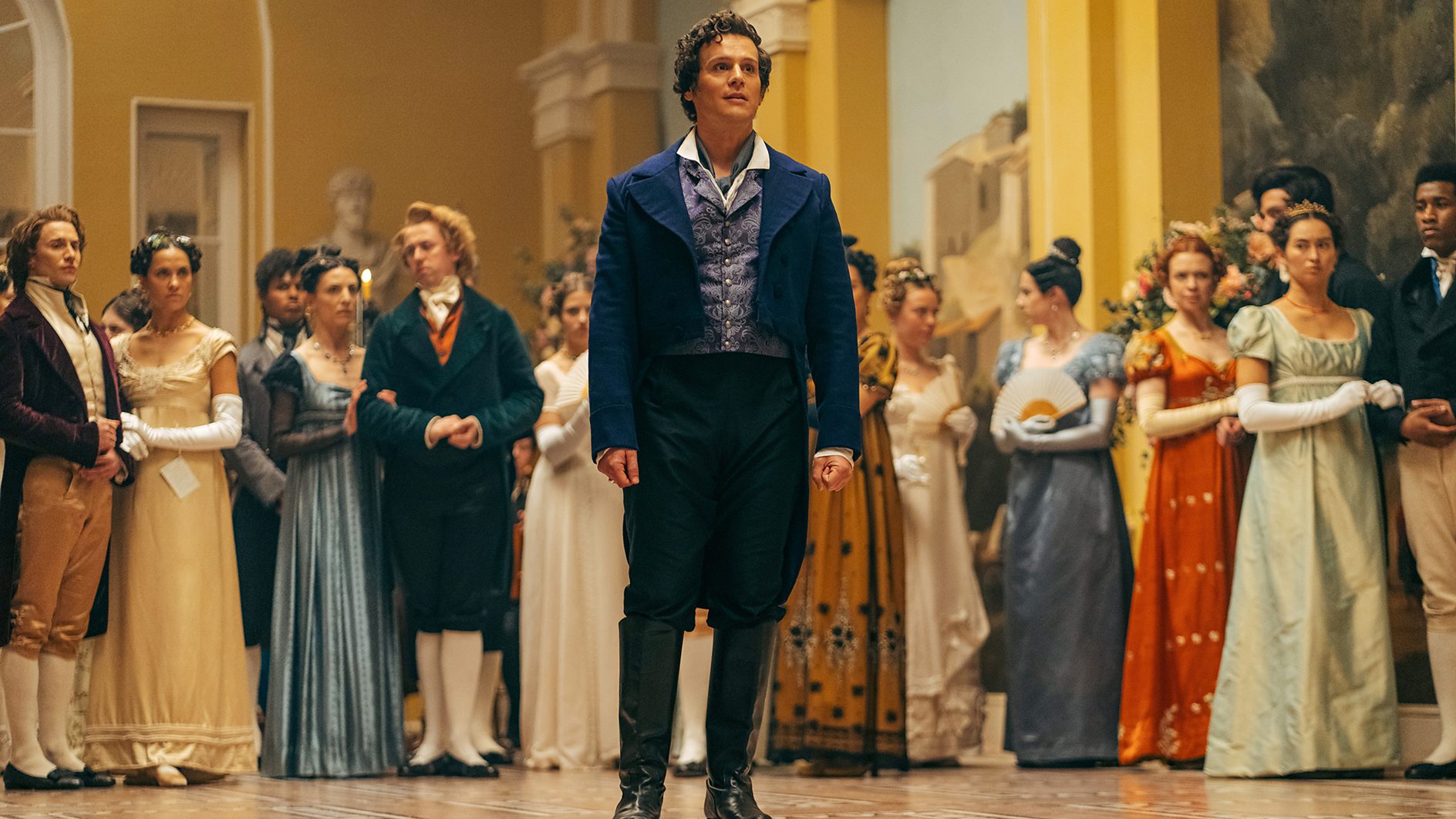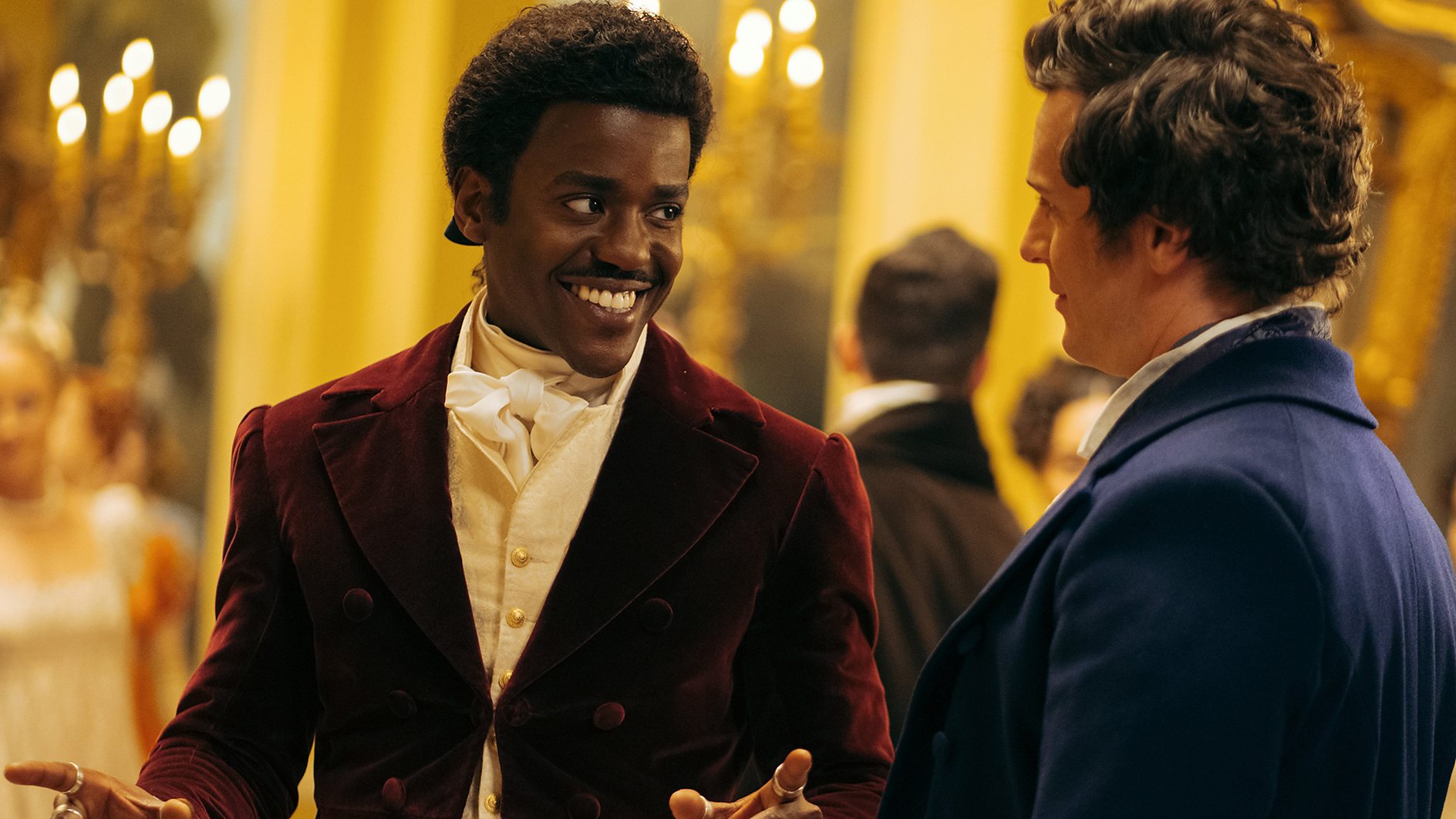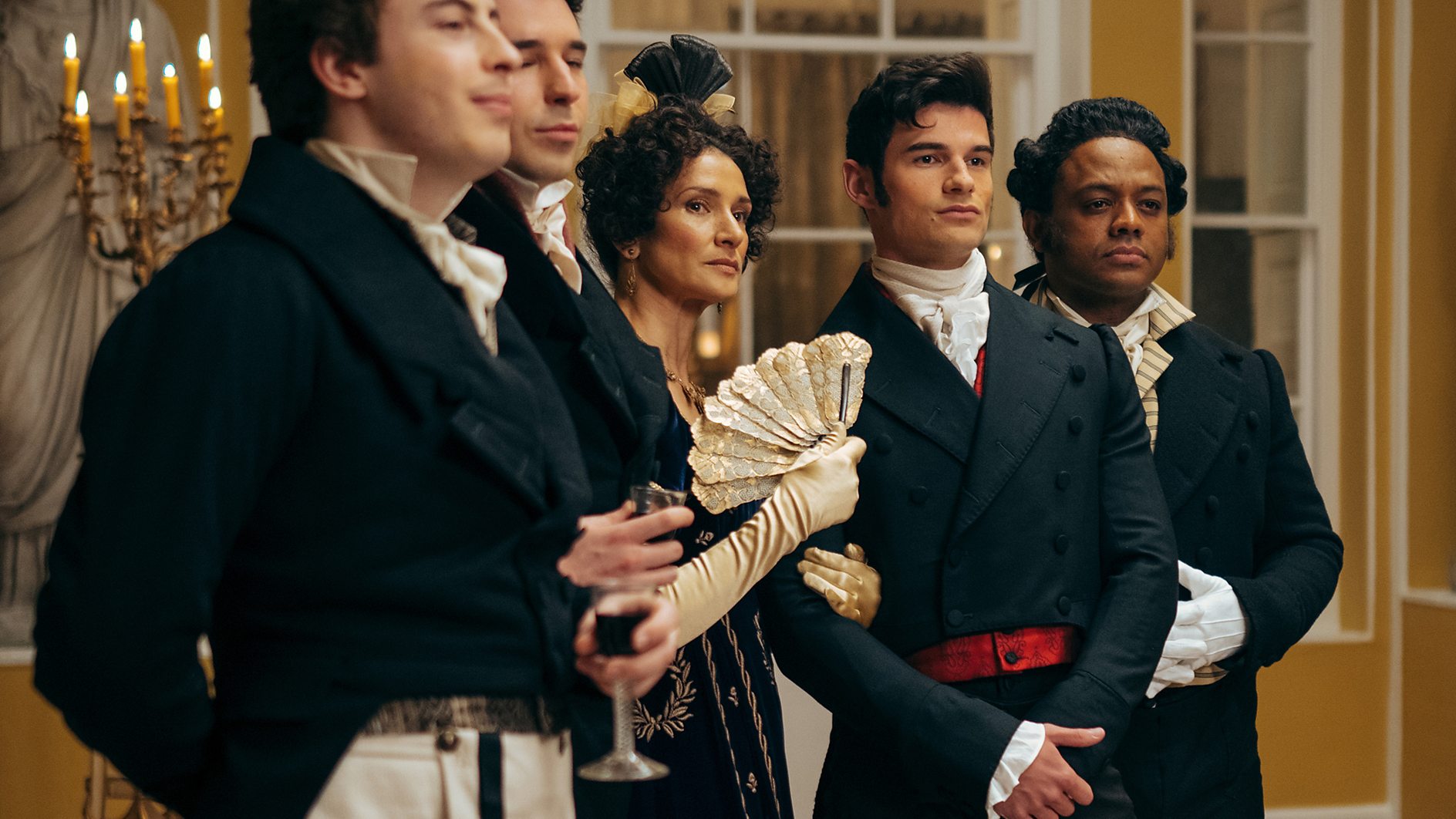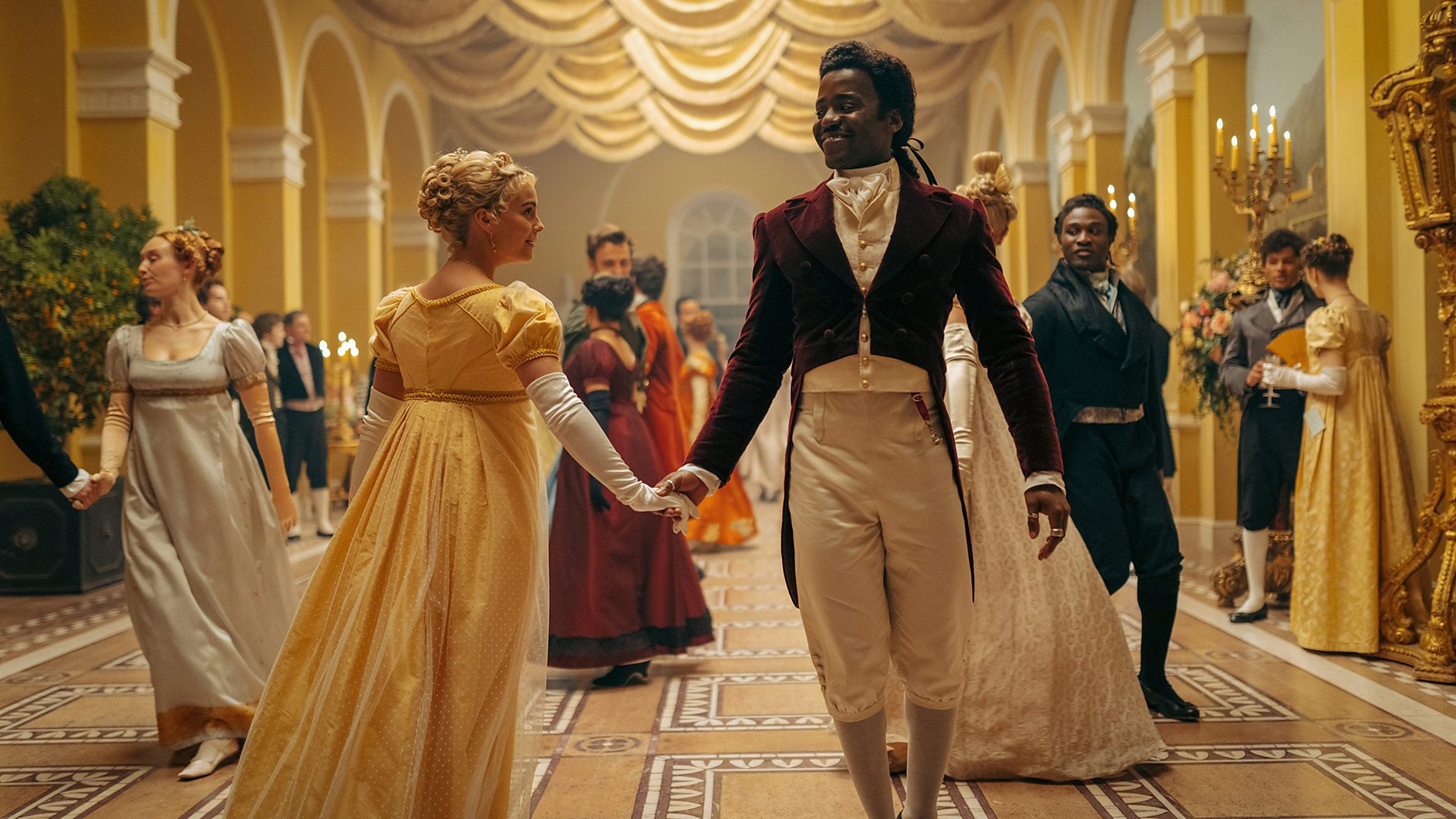Jonathan Groff, Indira Varma and choreographer Jack Murphy talk ballrooms, Beyoncé and the mysterious regency Rogue

Doctor Who series 14 episode Rogue sees the Doctor and Ruby land in 1813 where guests at the Duchess’s party are being murdered, and a mysterious bounty hunter called Rogue is about to change the Doctor’s life forever.
We caught up with Jonathan Groff (Rogue), Indira Varma (Duchess of Pemberton) and Jack Murphy (choreographer) to find out more…
Jonathan Groff (Rogue)

How did the role come about?
Oh my god! I got a very exciting text message from Russell T Davies, and I’m a huge fan of his work, especially It’s A Sin – I still haven’t recovered from it! So I was very excited to hear from him. He just wrote to me and told me that there was this role that was available on the show and asked me to play it.
Can you describe your character Rogue?
Rogue is an alien bounty hunter and a man of mystery. When we meet Rogue, and he first meets the Doctor, we’re in a Regency Era. Rogue is not necessarily who he appears to be when you meet him.
Have you always known of Doctor Who or been a fan of it? Or was this your first experience with the show?
I had known of Doctor Who and how much of a big deal it was in the UK, but I had never seen an episode of it. But Russell sent me about five episodes of Doctor Who from throughout the years, including the first episode that ever aired in black and white. So, I had a very quick crash course before I started.
What was the most challenging or unexpected thing about playing Rogue and stepping into the Whoniverse?
I would say the biggest challenge would be trying to understand and fit into the tone of the show – when you’re coming in as a guest star, jumping into a world, and Doctor Who is such a specific thing! In the episodes that Russell showed me, and in the experience of playing a role in it, Doctor Who has such a fascinating tone. It’s big, and it’s larger than life, but it’s also quite real and even though it’s fantasy, there is depth to the storytelling and to the relationships. I’d say the biggest challenge was coming in and trying to digest the tone as fast as possible, and to really articulate the character in the proper way in the world of the show.

What was it like acting alongside Ncuti and Millie?
Ncuti and Millie were both so warm and welcoming! Big smiles and full of laughs and embraces, they could not have been more warm. As an outsider, coming into the Whoniverse for the first time, they were the greatest hosts! They took such good care of me and everybody, truly everybody on the set, the crew, everyone!
I spent most of my time with Ncuti and I am obsessed with him. I think he is such a star. He’s so unpredictable and thrilling to act with because you never see the same thing twice. He’s so spontaneous, and yet so deeply connected to what he’s doing. He really cares. He’s really in it fully, and he’s got this force and positivity that is completely unique to him. It’s just phenomenal. I just adore him. I think he is one of the most exciting actors working today.
Did you have any unique experiences or memories from filming?
Well, one happened off set, it actually happened to be when Beyoncé was on her Renaissance Tour. I looked up her tour dates because I’m an obsessive Beyoncé fan. And I found that she was playing Cardiff. I asked that I was off by 4pm so I could make it to the stadium. And I brought Ncuti with me. So we got to see the Renaissance Tour together and it was so much fun. Amazing.
If you could travel anywhere in time and space, where would you?
This is less of a fantasy one. But my grandfather died on my 10th birthday. March 26, 1995. And I was really into I Love Lucy at the time. And one of my gifts for my birthday was this VHS with an episode of I Love Lucy. I went into the living room and I watched my VHS instead of hanging out with my family in the kitchen where my grandfather was. So if I had to go back in time, I would go back in time and I would hang out with him so I could ask him questions before he died.
Indira Varma (The Duchess)

How did your casting come about? And what was your initial reaction when you heard you’d be joining the Whoniverse?
I got an email from Russell, via my agent, asking me if I’d like to play the Duchess and was really excited. I worked with Russell on Torchwood back in the day. That was such a laugh. My character in Torchwood, Suzie, was only meant to be in the first episode. She was set up as one of the gang, but turned out to be the rotten egg and died. But then, as you can in the Whoniverse, was brought back to life for an episode as she was the only one who knew how to use the magic glove! It is so much fun to be part of this world and I really wanted to join the gang again.
What’s brilliant about Doctor Who is that it’s so British, which makes it very special to me as a Brit. Even though I wasn’t an avid watcher as a kid, I always feel like a fan, and I really appreciate the legacy. I love the fact that the Doctor regenerates. I am also in awe of how Russell is taking the Whoniverse to a different level. I don’t know how his mind works, but I feel like he lets his imagination run, and it’s always with generosity and compassion for his characters, and for the viewers. There’s something for everyone, and it’s always done with joy.
Can you tell us a bit about your character?
The Duchess is from Regency Era England. She’s a woman of society and is throwing an enormous party. It’s all very fabulous and fashionable, her costume is amazing. We find her at the centre of it all.
Did you have to do any dance lessons to learn the choreography?
Sadly, I didn’t get to dance. But I’ve actually worked with the choreographer, Jack Murphy, before! I worked with him years ago at the National, so it was lovely to see it all – it was beautiful! Everyone looked amazing on set. The costumes are incredible. As viewers will get to see, the costumes change throughout the episode and I had such fun seeing it all unfold!
How does Doctor Who differ from other projects you’ve worked on before?
I have been part of some massive shows with a huge history, including Star Wars and Game of Thrones. But with Doctor Who, I think it stands on its own within the genre and it’s uniquely British. I think that’s really important. I feel really proud to be in a British show. I really love the way that the companion is written as one of the viewers, an ordinary person, and they get to go on all these adventures. They are the eyes and ears of the audience and I think that’s brilliant.
Also the fact that the Doctor can go anywhere in time and space – anywhere, any universe, anytime in history. It’s not just the world that becomes your oyster, it’s the universe and beyond, isn’t it? And I just think that’s amazing. It can be silly and fun, and it’s also quite profound. There’s such humanity in it, and it can be incredibly moving. It’s got it all.
What was your first reaction when you read this script?
Well, I’ve always wanted to be in Jane Austen. So I was thrilled that it was Regency. I thought it was sort of a happy irony that because when I was growing up, they were always filming the Jane Austen adaptions, and being mixed race, I could never ever be in those shows. Now, it is all changing which is fantastic, with shows like Bridgerton, and similarly Doctor Who, it can do what it wants.
We are in a different time now and I was just so thrilled that I was going to be in a period drama from that time. Get the dress and wave the fan. It was a lot of fun to play the etiquette of that time. We had such a laugh, and I got to have so much fun with the Duchess character, doing all sorts of things! She’s the polar opposite to Suzie. The Duchess has her own agenda but she’s whimsical, greedy and playful.
Jack Murphy – Choreographer (The Devil’s Chord, Rogue)

Can you explain how you came to be involved in Doctor Who?
Phil Collinson, one of our Executive Producers, said, ‘let’s see if we can get the Bridgerton choreographer!’. I’ve filmed lots of ball sequences, so I was asked if I would be interested in working on the Regency episode. I was sent two scripts, Rogue and The Devil’s Chord, and I said ‘Yes, I would love to, so long as you let me do the twist as well because I’m never allowed out of the 19th Century!’ (laughs!)
Describe what scenes you choreographed for Rogue and the style of the dance.
I choreographed the ball sequence, which is set at a lavish party organised by Indira Varma’s character, The Duchess. I gave the Regency dancing a sense of the ‘then and now’ – I do that by combining Regency configurations, with modernity and some ballroom and Latin American dance. Of course, Regency dances are very sociable as it is where you went to meet people, many people say it was how they did speed dating!
Explain your process when coming up with a dance, what inspires you?
My process for developing any dance, especially for drama, is first and foremost reading the script. I get the inspiration from the writing, and I am like a detective in the sense that I have to see a continuum of the narrative of the characters before, during, and after a dance. The music that is chosen inspires me, along with the music length and the structure, which helps inform the rhythm and tempo.
How does it compare choreographing Regency in Rogue to the twist in The Devil’s Chord?
There is a big difference. The style in Regency is elegance – everything needs to look like it is happening very gently and isn’t causing any discomfort. Whereas the twist uses the hips and arm movements, and it’s very jerky and punchy. The contrast you get is a sudden quality in the twist, and a sustained quality in the Regency.
What is it like being on set?
Being on set is a celebration of the work. You get to be with a huge crew, when normally I am just in a dance studio working with a few actors. I love the collaboration and camaraderie – we’re a group of people who are all passionate about what we do, so it feels like a family.
What other elements play a part in pulling off a dance sequence?
The most important element is having collaboration. Where a camera is positioned can have a huge impact on a dance, so I walked the locations with our amazing director Ben Chessell. I gave an example of what the dances are, and what it would look like to say, have over fifty people doing the twist!
How is it choreographing for actors who may not have had any dance experience?
I always look to see if the actor has ever done any sports before because I use a lot of analogies when I teach. There are two reasons to dance – to have or to give pleasure. They’re not in Strictly Come Dancing where they are dancing to get a score. When you are dancing in a television drama, you are dancing so that the story can continue, it’s not about how well you dance. I encourage them to enter into the dance using an actors language and because I trained as an actor, everything I use language-wise is available to them. My job is to find a way to make them feel comfortable to undertake that task.